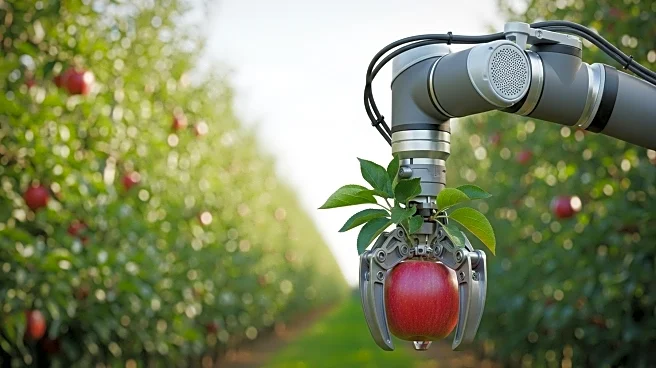What's Happening?
Orchard Robotics, a startup founded by Charlie Wu, has raised $22 million in Series A funding to advance its AI-driven agricultural technology. Wu, inspired by his grandparents' apple farming in China, developed the idea while studying computer science at Cornell University. The company uses cameras and AI to help fruit growers manage crops more precisely, addressing the issue of imprecise manual sampling in large farms. The funding round was led by Quiet Capital and Shine Capital, with participation from General Catalyst and Contrary.
Why It's Important?
The funding for Orchard Robotics highlights the growing interest in applying AI to agriculture, a sector traditionally reliant on manual processes. By improving crop management through precise data collection and analysis, Orchard Robotics aims to enhance productivity and reduce waste in farming operations. This technological advancement could lead to more efficient use of resources, potentially lowering costs for farmers and increasing the availability of high-quality produce. The move also signals a shift towards more sustainable agricultural practices, which could have significant implications for food security and environmental conservation.
What's Next?
Orchard Robotics plans to expand its technology to additional crops such as blueberries, cherries, almonds, pistachios, citrus, and strawberries. The company aims to develop an operating system that integrates data collection with farm management workflows, potentially transforming the agricultural industry. As AI technology evolves, Orchard Robotics could offer autonomous decision-making capabilities, further enhancing farm operations. The startup's growth may prompt increased competition and innovation in the agricultural tech sector, influencing how farms operate and manage resources.
Beyond the Headlines
The use of AI in agriculture raises ethical and cultural considerations, particularly regarding the impact on traditional farming practices and employment. As technology becomes more integrated into farming, there may be concerns about data privacy and the control of agricultural information. Additionally, the shift towards AI-driven farming could alter the cultural landscape of rural communities, affecting the livelihoods of those who rely on traditional methods.









